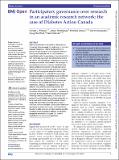Files in this item
Participatory governance over research in an academic research network : the case of Diabetes Action Canada
Item metadata
| dc.contributor.author | Willison, Donald J | |
| dc.contributor.author | Trowbridge, Joslyn | |
| dc.contributor.author | Greiver, Michelle | |
| dc.contributor.author | Keshavjee, Karim | |
| dc.contributor.author | Mumford, Doug | |
| dc.contributor.author | Sullivan, Frank | |
| dc.date.accessioned | 2019-04-23T10:30:01Z | |
| dc.date.available | 2019-04-23T10:30:01Z | |
| dc.date.issued | 2019-04 | |
| dc.identifier | 258699773 | |
| dc.identifier | bbedf639-bc61-434a-890d-d52e06accac9 | |
| dc.identifier | 31005936 | |
| dc.identifier | 85064993215 | |
| dc.identifier | 000471157200217 | |
| dc.identifier.citation | Willison , D J , Trowbridge , J , Greiver , M , Keshavjee , K , Mumford , D & Sullivan , F 2019 , ' Participatory governance over research in an academic research network : the case of Diabetes Action Canada ' , BMJ Open , vol. 9 , no. 4 , e026828 . https://doi.org/10.1136/bmjopen-2018-026828 | en |
| dc.identifier.issn | 2044-6055 | |
| dc.identifier.other | ORCID: /0000-0002-6623-4964/work/56862297 | |
| dc.identifier.uri | https://hdl.handle.net/10023/17579 | |
| dc.description | This work was supported by Diabetes Action Canada, which is funded, in part, through a Canadian Institutes of Health Research chronic disease network grant under the Strategy for Patient-Oriented Research (Funding Reference number: SCA 145101). | en |
| dc.description.abstract | Digital data generated in the course of clinical care are increasingly being leveraged for a wide range of secondary purposes. Researchers need to develop governance policies that can assure the public that their information is being used responsibly. Our aim was to develop a generalisable model for governance of research emanating from health data repositories that will invoke the trust of the patients and the healthcare professionals whose data are being accessed for health research. We developed our governance principles and processes through literature review and iterative consultation with key actors in the research network including: a data governance working group, the lead investigators and patient advisors. We then recruited persons to participate in the governing and advisory bodies. Our governance process is informed by eight principles: (1) transparency; (2) accountability; (3) follow rule of law; (4) integrity; (5) participation and inclusiveness; (6) impartiality and independence; (7) effectiveness, efficiency and responsiveness and (8) reflexivity and continuous quality improvement. We describe the rationale for these principles, as well as their connections to the subsequent policies and procedures we developed. We then describe the function of the Research Governing Committee, the majority of whom are either persons living with diabetes or physicians whose data are being used, and the patient and data provider advisory groups with whom they consult and communicate. In conclusion, we have developed a values-based information governance framework and process for Diabetes Action Canada that adds value over-and-above existing scientific and ethics review processes by adding a strong patient perspective and contextual integrity. This model is adaptable to other secure data repositories. | |
| dc.format.extent | 9 | |
| dc.format.extent | 1021390 | |
| dc.language.iso | eng | |
| dc.relation.ispartof | BMJ Open | en |
| dc.subject | RA Public aspects of medicine | en |
| dc.subject | RC Internal medicine | en |
| dc.subject | ZA4050 Electronic information resources | en |
| dc.subject | T-NDAS | en |
| dc.subject | SDG 3 - Good Health and Well-being | en |
| dc.subject.lcc | RA | en |
| dc.subject.lcc | RC | en |
| dc.subject.lcc | ZA4050 | en |
| dc.title | Participatory governance over research in an academic research network : the case of Diabetes Action Canada | en |
| dc.type | Journal article | en |
| dc.contributor.institution | University of St Andrews. School of Medicine | en |
| dc.contributor.institution | University of St Andrews. Sir James Mackenzie Institute for Early Diagnosis | en |
| dc.contributor.institution | University of St Andrews. Population and Behavioural Science Division | en |
| dc.identifier.doi | https://doi.org/10.1136/bmjopen-2018-026828 | |
| dc.description.status | Peer reviewed | en |
This item appears in the following Collection(s)
Items in the St Andrews Research Repository are protected by copyright, with all rights reserved, unless otherwise indicated.

